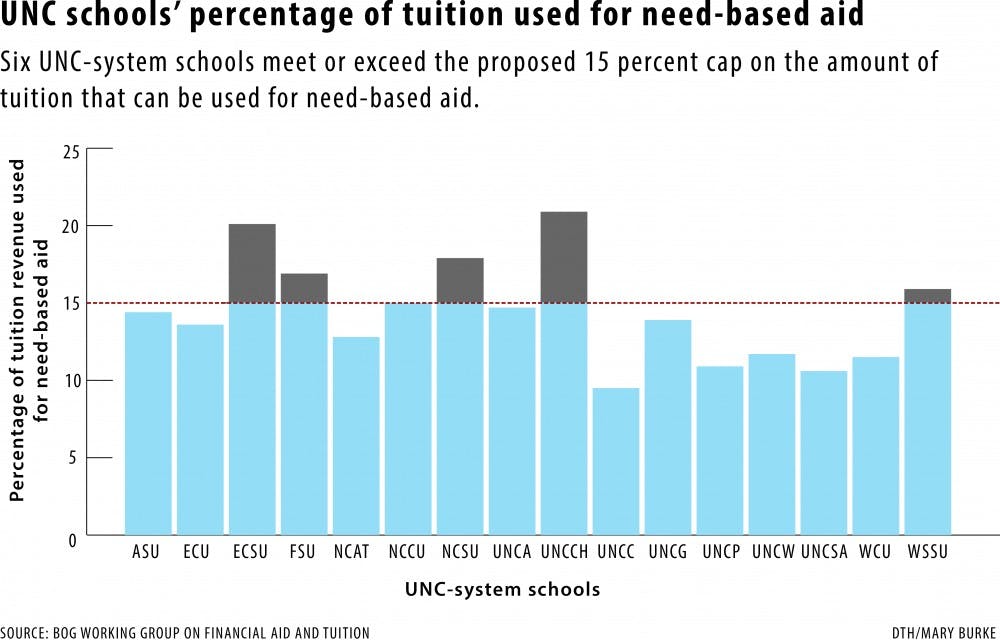Smith said
the cap aims to change the model used to pay for need-based financial aid . Proponents
of the cap say using a large portion of undergraduate tuition to pay for
the aid places an unfair burden on the middle class.
The UNC angle
UNC-Chapel Hill exceeds the 15 percent threshold by 5.9 percent —
more than $19 million above the cap. Five other UNC-system campuses also meet or exceed the 15 percent cap .
The proposal does not
force schools to recede to that 15 percent level — instead, it would
freeze the budgeted amount of tuition revenue going to aid.
If the "Freeze and Cap" proposal is approved, UNC-Chapel Hill will only be allowed to use its current budgeted amount — about $67.5 million, which is 32 percent of the total budgeted need-based financial aid from all 16 universities in the system — to support need-based financial aid, even if tuition rose.
UNC-Chapel Hill’s Office of Scholarship and Student Aid estimates the proposal could cause the average student’s debt to double — from $17,000 in loans to $33,000 — within three to four years, said Shirley Ort , the office’s associate provost and director .
More than a third of UNC-Chapel Hill students currently take out loans each year. If the policy goes into effect it could cause about 50 percent of students to borrow in about three years, Ort said .
Ort said she is more concerned about the future of UNC’s affordability than she’s ever been in her 17 years working for the University.
“For over two centuries, the taxpayers of the state of North Carolina have invested in this great institution,” she said. “They’ve done so at great sacrifice to themselves...because the taxpayers want to make sure the benefits of this institution are available to everyone in the state, not just those with money."
“The decision by the (Board of Governors) starts to breach that contract.”
A ‘lose-lose decision’
Donald Hornstein, a professor in the UNC School of Law, said he believes higher education needs to find a way to cut costs. It was that philosophy that prompted him to create one of the University’s first free massive open online course — or MOOC — as a way to explore cheaper, high-quality education .
To get the day's news and headlines in your inbox each morning, sign up for our email newsletters.
The proposal the committee approved this week will not have the cost-cutting effects it was intended for, said Hornstein, the chairman of UNC-Chapel Hill's Faculty Council Committee on Scholarships, Awards and Student Aid .
"It may be the biggest lose-lose decision I've ever seen made by a public body, ever,” he said. “It was done in seven minutes, there was no discussion and the supporting materials were thin."
Hornstein said the proposal could prevent students from attending the University or cause them to graduate with more debt.
"It also seemed to be, from what I could tell, a solution — if you want to call it that — desperately in search of a problem,” he said. “UNC-Chapel Hill is increasingly viewed as the model for an affordable university.”
“This decision pulled the rug out from under all of that."
Hornstein said non-tuition costs, such as housing, food and health care, could increase by $3,000 by 2016, $4,000 by 2017 and continue to rise. Due to the proposed need-based aid cap, UNC would not be able to give additional need-based aid to fill that gap.
Fundraising as a solution
W.G. “Champ” Mitchell, a member of the Board of Governors who sits on the committee for budget and finance, said the cap is just a preliminary measure — the board hopes to find other potential revenue sources for need-based aid to ensure those exemplary students who deserve help receive the money they need .
“This is a first step; it is not the end of the discussion,” Mitchell said. “We felt that putting this cap was important for the coming school year.”
UNC-Chapel Hill does not yet have any plans in the works to raise money for need-based aid because the proposal was passed so quickly, Ort said.
“I think some of the BOG thinks we can fill in the gap with private money that could fill this hole,” she said.
“If we were to go out and raise the endowment — even a large endowment — it would take so much time. It takes so much time and money to raise money.”
state@dailytarheel.com




